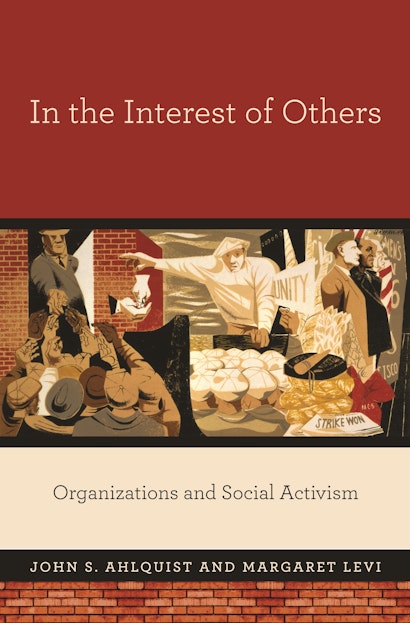In the Interest of Others develops a new theory of organizational leadership and governance to explain why some organizations expand their scope of action in ways that do not benefit their members directly. John Ahlquist and Margaret Levi document eighty years of such activism by the International Longshore and Warehouse Union in the United States and the Waterside Workers Federation in Australia. They systematically compare the ILWU and WWF to the Teamsters and the International Longshoremen’s Association, two American transport industry labor unions that actively discouraged the pursuit of political causes unrelated to their own economic interests.
Drawing on a wealth of original data, Ahlquist and Levi show how activist organizations can profoundly transform the views of members about their political efficacy and the collective actions they are willing to contemplate. They find that leaders who ask for support of projects without obvious material benefits must first demonstrate their ability to deliver the goods and services members expect. These leaders must also build governance institutions that coordinate expectations about their objectives and the behavior of members.
In the Interest of Others reveals how activist labor unions expand the community of fate and provoke preferences that transcend the private interests of individual members. Ahlquist and Levi then extend this logic to other membership organizations, including religious groups, political parties, and the state itself.
Awards and Recognition
- Co-Winner of the 2014 Best Book Award, The Labor Project of the American Political Science Association
"Ahlquist and Levi are able to show how the ILWU was able and remains able to transcend the life trajectory of its founding leader, Harry Bridges, and establish and maintain a commitment to social activism, political mobilization, and an expanded community of fate. Those who wish to move the labor movement toward this vision of social movement unionism would do well to examine this work for its insights."—Jacob Lesniewski, Social Service Review
"The study is an interesting and convincing discussion of why an organization may expand its interests and even support causes or ideas that seem to violate the self-interests of its members. It should add significantly to both the literature on collective action and institutional choice."—Choice
"This is an impressive book that sheds light on an important but poorly understood topic: Why do some organizations engage in solidaristic behavior to promote wider social justice issues, while others focus narrowly on the self-interest of their members?"—Evelyne Huber, Perspectives on Politics
"The book is quite brilliant in terms of the rigor of its analytic argument and its use of a variety of methods to test and further revise core assumptions. . . . The book is itself a major achievement of collective (research) action to which anyone working on these kinds of questions ought to pay special attention."—Carmen Sirianni, Perspectives on Politics
"An essential part of any trade union program preparing people for leadership roles."—Rowan Cahill, Labour History
"Why do the members of some trade unions sacrifice time and money to support the causes of others halfway around the world? Ahlquist and Levi provide a convincing answer: founders who build organizations that deliver good jobs to members may also build organizations that transform members' values to support international solidarity. This outstanding book is a must-read for scholars of organizational and political sociology, collective action, and behavioral economics."—Elisabeth Jean Wood, Yale University
"Ahlquist and Levi shed fresh new light on one of the most enduring questions in the social sciences. Tapping an impressive array of methods and evidence, this pathbreaking study explores the conditions under which a broad 'community of fate' can be forged and sustained over time, as well as the long-term consequences for the beliefs and preferences of those who comprise that community. This is a major scholarly contribution whose core message will resonate widely among economists, sociologists, and political scientists alike."—Kathleen Thelen, Massachusetts Institute of Technology
"A fundamental problem in understanding collective action is why individuals in some organizations take actions for the greater good that are not in their own self-interest. Ahlquist and Levi shed fascinating new light on this problem through an examination of the evolution, organization, and behavior of four labor unions with very different scopes of social, political, and economic engagement. A must-read for any scholar interested in problems of collective action."—Henry Farber, Princeton University
"The product of sustained imagination, this important book probes the conditions under which people transcend narrow economic calculations to opt for social justice. By mobilizing analytical tools and deploying them systematically in determinate situations, this beautifully realized comparative analysis of Australian and American trade unions powerfully advances our understanding of organizational leadership, norms, beliefs, networks, scope, mobilization, and much more."—Ira Katznelson, author of Fear Itself: The New Deal and the Origins of Our Time
"Ahlquist and Levi have produced the very best rational-choice treatment of activist labor unions. Theoretically, methodologically, and empirically rich, their book is also a superb exemplar of modern comparative politics. In the Interest of Others is a classy and elegant study of a significant political problem."—Mark Lichbach, University of Maryland
"In the Interest of Others deals with a truly important issue that has not been adequately analyzed in political science and sociology. This book is going to have a deep impact on the discipline."—Ignacio Sánchez-Cuenca, Juan March Institute, Madrid

